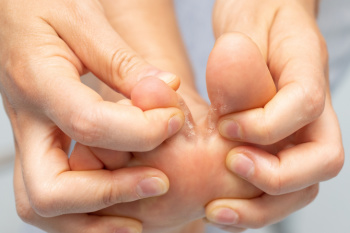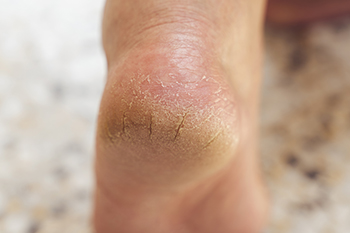
Athlete's foot, also known as tinea pedis, is a common fungal infection that affects the skin of the feet. It thrives in warm, moist environments such as locker rooms, public showers, and sweaty shoes. This condition often begins between the toes but can spread to other parts of the foot. Common symptoms include itching, burning, and stinging sensations, along with peeling or cracking skin. Redness and scaling may also appear, sometimes accompanied by an unpleasant odor. The fungus responsible for athlete's foot is contagious and can be contracted by walking barefoot on contaminated surfaces or sharing personal items. People who wear tight footwear or keep their feet damp for long periods are more at risk. Athlete’s foot can be uncomfortable and irritating. If you have developed this foot condition, it is suggested that you consult a podiatrist who can effectively treat athlete’s foot, which may include prescribed medication.
Athlete’s Foot
Athlete’s foot is often an uncomfortable condition to experience. Thankfully, podiatrists specialize in treating athlete’s foot and offer the best treatment options. If you have any questions about athlete’s foot, consult with Dr. Ronald Sheppard from Warren-Watchung Podiatry Center. Our doctor will assess your condition and provide you with quality treatment.
What Is Athlete’s Foot?
Tinea pedis, more commonly known as athlete’s foot, is a non-serious and common fungal infection of the foot. Athlete’s foot is contagious and can be contracted by touching someone who has it or infected surfaces. The most common places contaminated by it are public showers, locker rooms, and swimming pools. Once contracted, it grows on feet that are left inside moist, dark, and warm shoes and socks.
Prevention
The most effective ways to prevent athlete’s foot include:
- Thoroughly washing and drying feet
- Avoid going barefoot in locker rooms and public showers
- Using shower shoes in public showers
- Wearing socks that allow the feet to breathe
- Changing socks and shoes frequently if you sweat a lot
Symptoms
Athlete’s foot initially occurs as a rash between the toes. However, if left undiagnosed, it can spread to the sides and bottom of the feet, toenails, and if touched by hand, the hands themselves. Symptoms include:
- Redness
- Burning
- Itching
- Scaly and peeling skin
Diagnosis and Treatment
Diagnosis is quick and easy. Skin samples will be taken and either viewed under a microscope or sent to a lab for testing. Sometimes, a podiatrist can diagnose it based on simply looking at it. Once confirmed, treatment options include oral and topical antifungal medications.
If you have any questions, please feel free to contact one of our offices located in Marlboro and Watchung, NJ . We offer the newest diagnostic and treatment technologies for all your foot care needs.

Foot pain while cycling can be frustrating and may affect performance and comfort. Common issues include numb feet, burning sensations, and sore soles, often caused by pressure on nerves or poor circulation. Tight shoes or poorly placed cleats may contribute to these symptoms by compressing nerves or restricting blood flow. Plantar fasciitis can also be aggravated by cycling, as the repetitive motion and pressure on the arch strain the plantar fascia. Metatarsalgia, which involves pain in the ball of the foot, may result from excessive pressure during pedaling or from footwear lacking proper support. Long rides, improper bike fit, and insufficient arch support all play a role. Foot pain may cause you to temporarily stop cycling. If this has happened to you, it is suggested that you consult a podiatrist who can offer effective relief and treatment solutions, enabling you to return to this popular activity.
Ankle and foot injuries are common among athletes and in many sports. They can be caused by several problems and may be potentially serious. If you are feeling pain or think you were injured in a sporting event or when exercising, consult with Dr. Ronald Sheppard from Warren-Watchung Podiatry Center. Our doctor will assess your condition and provide you with quality foot and ankle treatment.
Common Injuries
The most common injuries that occur in sporting activities include:
- Achilles Tendonitis
- Achilles Tendon Rupture
- Ankle Sprains
- Broken Foot
- Plantar Fasciitis
- Stress Fractures
- Turf Toe
Symptoms
Symptoms vary depending upon the injury and in some cases, there may be no symptoms at all. However, in most cases, some form of symptom is experienced. Pain, aching, burning, bruising, tenderness, tightness or stiffness, sensation loss, difficulty moving, and swelling are the most common symptoms.
Treatment
Just as symptoms vary depending upon the injury, so do treatment options. A common treatment method is known as the RICE method. This method involves rest, applying ice, compression and elevating the afflicted foot or ankle. If the injury appears to be more serious, surgery might be required, such as arthroscopic or reconstructive surgery. Lastly, rehabilitation or therapy might be needed to gain full functionality in the afflicted area. Any discomfort experienced by an athlete must be evaluated by a licensed, reputable medical professional.
If you have any questions, please feel free to contact one of our offices located in Marlboro and Watchung, NJ . We offer the newest diagnostic and treatment technologies for all your foot care needs.

Cracked heels, or heel fissures, occur when the skin on the bottom of the feet becomes excessively dry and splits under pressure. Initially, these cracks may be superficial, causing minimal discomfort. However, without proper care, heel fissures can deepen, leading to pain, bleeding, and an increased risk of infection. Factors contributing to cracked heels include prolonged standing, wearing open-back shoes, walking barefoot, obesity, and medical conditions such as diabetes. Symptoms often involve discomfort while standing or walking, itching, and visible flaking of the skin. To address this issue, a podiatrist can remove thickened skin, apply dressings to minimize skin movement, and recommend appropriate footwear to alleviate pressure on the heels. If you have painful heel fissures, it is suggested that you schedule an appointment with a podiatrist for an exam and appropirate treatment.
If the skin on your feet starts to crack, you may want to see a podiatrist to find treatment. If you have any concerns, contact Dr. Ronald Sheppard from Warren-Watchung Podiatry Center. Our doctor can provide the care you need to keep you pain-free and on your feet.
Cracked Heels
It is important to moisturize your cracked heels in order to prevent pain, bleeding, and infection. The reason cracked heels form is because the skin on the foot is too dry to support the immense pressure placed on them. When the foot expands, the dry skin on the foot begins to split.
Ways to Help Heal Them
- Invest in a good foot cream
- Try Using Petroleum Jelly
- Ease up on Soaps
- Drink Plenty of Water
Ways to Prevent Cracked Heels
- Moisturize After Showering
- Skip a Shower
- Keep Shower Water Lukewarm
- Don’t Scrub Your Feet
If you are unsure how to proceed in treating cracked heels, seek guidance from a podiatrist. Your doctor will help you with any questions or information you may need.
If you have any questions, please feel free to contact one of our offices located in Marlboro and Watchung, NJ . We offer the newest diagnostic and treatment technologies for all your foot care needs.

